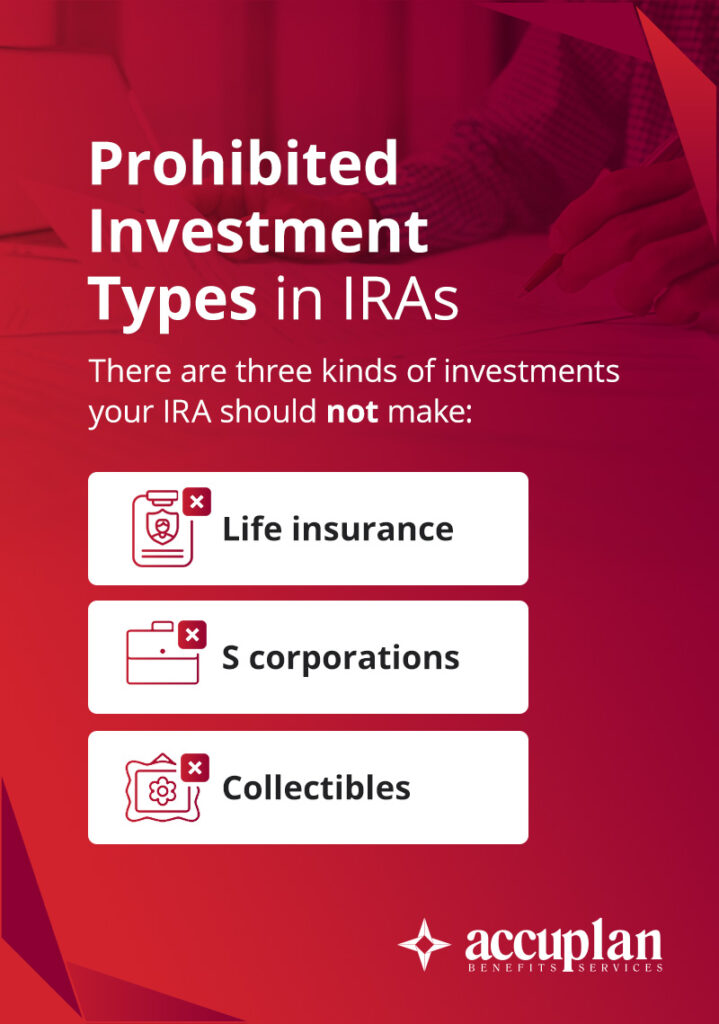
When self-directed IRA investing, it’s essential to be aware of the self-directed IRA prohibited transactions and who is classified as a disqualified person. These are transactions that could disqualify the tax status of your retirement account, so it’s crucial to avoid them. This blog post will go over popular self-directed IRA prohibited transactions, the consequences of creating one and how to avoid common mistakes.
Who Are Disqualified Persons?
Before you make any decisions concerning your IRA, you need to understand who classifies as a disqualified person to avoid engaging them in a prohibited investment or transaction. A disqualified person is someone who is not allowed to directly or indirectly benefit from your IRA until after your retirement.
When a disqualified person interacts with your IRA, depending on the intent and outcome, it may be considered a prohibited transaction or investment. Disqualified persons include:
- You, as the IRA owner
- A fiduciary for the IRA
- Your spouse
- Your descendants
- Your ascendants or ancestors
- The spouses of your descendants or ascendants
- Anyone who has control or discretionary authority over your IRA assets
- Anyone who has responsibility for or discretionary authority over administering your IRA
- Anyone who provides fee-based investment advice for your IRA
Prohibited Transactions and Investments in Self-Directed IRAs
To ensure your self-directed IRA remains tax-advantaged until retirement, you need to stay educated about prohibited transactions and investments in self-directed IRAs. Here are the most common ones to avoid.
1. Prohibited Investment Types in IRAs

There are three kinds of investments your IRA should not make:
- Life insurance: It is prohibited for the IRA to invest in life insurance for the IRA owner and other disqualified persons. This means that it may only be acceptable to purchase life insurance with an IRA for someone who is not a disqualified person.
- S corporations: While it is not prohibited for an IRA to purchase the stock of a sub-chapter S corporation, it is prohibited for that S corporation to have an IRA as a shareholder.
- Collectibles: You cannot use an IRA to invest in assets deemed collectible, such as rugs, gems, artwork, alcoholic beverages, stamps, jewelry, most metals, antiques and coins.
2. Transactions With Disqualified Persons
This can include selling, leasing, or exchanging property between the IRA and a disqualified person. It also includes engaging in a transaction with a disqualified person.
3. Using IRA Property for Personal Benefit
There are two main things you’ll want to make sure of to maintain the retirement status of your account. First, make sure you have not taken any distributions from the account while in retirement. Second, and most importantly, do not receive any personal benefit from your property while the IRA owns. This can include using IRA-owned real estate as a personal residence or a vacation home.
4. Borrowing Money From the IRA
Retirement accounts are meant to benefit you while in retirement and no earlier. If a disqualified person or yourself borrows money from your self-directed IRA for personal benefit, it is called self-dealing. It’s important to be aware of the self-dealing rules of self-directed IRAs to avoid disqualifying the account’s tax status as a retirement plan. Some prohibited transaction examples of self-dealing include lending money to yourself from the IRA, buying or selling property to yourself, personally taking IRA income or paying IRA expenses.
5. Personally Living in or Using Real Estate

Living in the property your IRA has purchased would be considered a disqualified transaction called personal benefit. While you live in the property, it is used for personal benefit and isn’t being held for investment purposes. This can easily cancel the retirement status of your account.
6. Disqualified Persons Living in, Working on or Using the Property
Disqualified persons are prohibited from using, living in or working on your IRA-owned property. This means even staying on the property for one night is prohibited. Similarly, disqualified persons can’t do renovations on the property even if they own a construction company. The IRS prohibits any action that directly or indirectly benefits you or the disqualified person, even if they are being paid for the work.
7. Sweat Equity
Sweat equity refers to the work you personally do on a property in your IRA. This is prohibited regardless of the size of the job or your expertise. Avoid doing any and all repairs, maintenance and improvements on the property. You need to hire an outside, third-party contractor to complete all of the renovations. If disqualified persons or you are involved in the renovations or upkeep, you put your retirement account at risk. Doing this could be seen as an indirect benefit due to the money you saved doing the work yourself, and ruin the tax status of your retirement account.
8. Using the IRA as Security for a Loan
You cannot use your IRA as security for a loan. If you do, the amount offered as security may be deemed a distribution and treated as such. Early distributions will be subject to an additional tax penalty and be included in your gross income.
You may be able to use your IRA to take out a short-term personal loan when you first open the account. This is possible if you use the 60-day rollover rule, which allows you to borrow funds from the IRA so long as you place the money back within 60 days. Even if you use this loophole, there are several rules to consider to ensure you avoid a prohibited transaction.
Otherwise, you may want to consider using a self-directed Roth IRA to avoid prohibited transactions. Contributions to these accounts are made up of after-tax dollars, allowing you to withdraw only contributions without triggering a tax liability.
Consequences of Engaging in a Prohibited Transaction
It’s important to understand what happens when you create a prohibited transaction. Here are the three main consequences of engaging in a prohibited transaction:
- IRA disqualification: Prohibited transactions will disqualify your self-directed IRA. When this occurs, the entire account will be considered distributed as of the first day of the year in which you made the transaction. This takes away the IRA’s tax advantages, causing the account’s entire value to become taxable.
- Penalties and tax: All tax-deferred funds in the IRA will immediately be subject to state and federal income tax. If you do not meet distribution exceptions as set by the IRS and are under 59 ½, you will also need to pay a 10% early withdrawal penalty for the IRA prohibited transaction.
- Additional excise tax: Disqualified persons will need to pay an initial 15% excise tax on the total transaction amount, which applies to each year during the taxable period. The taxable period is the time between when the transaction occurred and when it was corrected. The disqualified person who participated in the prohibited transaction must correct the prohibited transaction during this period. If not, an additional 100% tax will be imposed on the amount.

If you believe the administrator or custodian made an administrative error, you may have 14 days to correct the issue and prove otherwise to avoid these consequences.
How to Avoid Common Mistakes and Stay Compliant
These best practices can help you avoid common mistakes:
- Understand IRA transaction and investment rules: You’re already taking the first step by reading this guide about self-directed IRA prohibited transactions. It’s important to educate yourself on the self-directed IRA rules and IRS guidelines about permissible investments and transactions. It also helps to research these rules each year to keep up to date with the latest changes.
- Maintain accurate documentation: Another common mistake is a lack of detailed recordkeeping. Not having sufficient proof makes it challenging to prove that you are staying compliant with IRS rules. It’s beneficial to keep personal copies of everything related to your self-directed IRA. This includes ownership documents, transactions and financial agreements. This way, if audits occur, you’ll have the proper records to prove your compliance.
- Choose a reliable self-directed IRA provider: Your self-directed IRA custodian will typically be in charge of recordkeeping and reporting to the IRS. Make sure you partner with a reliable provider who will accurately record data and report them on time. You can do so by checking their website to see how many years of experience they have and their reviews to see whether current and past clients are satisfied with their services.
- Use assistance from knowledgeable professionals: Before taking any action, getting a second opinion from a knowledgeable professional may help if you accidentally misinterpret IRS guidelines and IRA rules. Some valuable professionals include financial planners, tax advisors and legal counsel. Be sure to also check their expertise through their website and reviews.
Open a Self-Directed IRA With Accuplan
Having a self-directed IRA can seem overwhelming, especially with all the rules and things to be aware of. We hope this information has helped clear things up. Click here if you would like information about prohibited alternative investments inside an IRA.
We at Accuplan are experts in self-directed retirement account investing. Whether you have any questions about prohibited transaction rules inside retirement accounts or want to start and use a self-directed IRA responsibly, contact our knowledgeable team for more information today.

Disclaimer: Our information shouldn’t be relied upon for investment advice but simply for information and educational purposes only. It is not intended to provide, nor should it be relied upon for accounting, legal, tax or investment advice.